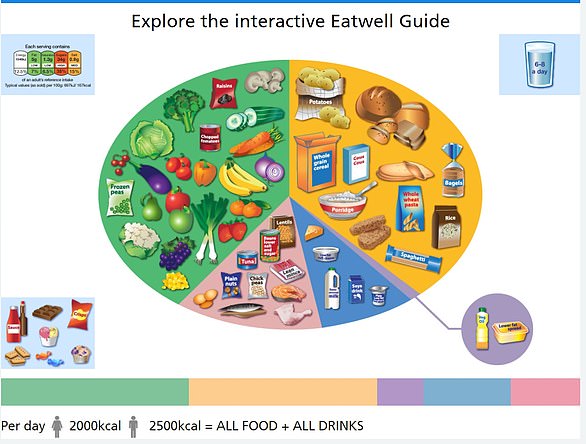Eating wrong type of VEG ‘may make you fat in middle-age’: Tucking into an extra 100g of potatoes, peas or corn each day could add nearly 6lbs to your waistline, study suggests
- American researchers looked at the diets of 136,432 people for about 24 years
- Those who ate the most non-starchy vegetables gained an average of 6.6 pounds less
New research suggests that eating the wrong kinds of vegetables could cause you to pack on the pounds in middle age.
People who eat more peas, corn and potatoes are more likely to gain weight than people who eat non-starchy vegetables such as broccoli, carrots and spinach.
Meanwhile, switching to high-fiber foods – such as whole grains and fruits, including apples and pears – can also reduce the effects of midlife spread, they found.
Researchers from the Harvard TH Chan School of Public Health looked at the diets of 136,432 men and women aged 65 or younger between 1986 and 2014, over an average period of 24 years.
Participants completed questionnaires about personal characteristics, medical history, lifestyle and other health-related factors at the beginning of the study and every 2-4 years thereafter.
People who eat more peas, corn and potatoes are more likely to gain weight than people who eat non-starchy vegetables such as broccoli, carrots and spinach. Meanwhile, switching to fiber-rich foods – such as whole grains and fruits, including apples and pears – can also reduce the effects of midlife spread, scientists found
On average, people gained 1.5kg every four years, which equates to around 1.5 stone over the next twenty years.
They found that increases in the glycemic index and glycemic load – measures of the effects of different foods on blood sugar levels – were strongly linked to weight gain.
For example, an increase of 100 grams of starch or added sugars per day was associated with 3.3 and 1.9 pounds greater weight gain, respectively, over a four-year period.
Those who ate the most non-starchy vegetables, such as broccoli, carrots and spinach, gained an average of 6.6 pounds less, while those who indulged in potatoes and corn could expect an additional 5.7 pounds in serving size over the same period.
An increase of 10 grams of fiber per day was linked to an average of 1.7 pounds lower weight, according to the findings published in the BMJ.
The associations were stronger in participants with excessive body weight than in participants with normal weight. Most of these associations were also stronger among women.
In further analyses, the researchers found that replacing carbohydrates from refined grains, starchy vegetables and sugar-sweetened beverages with equal servings of carbohydrates from whole grains, fruits and non-starchy vegetables was associated with less weight gain.
The authors note that it is an observational study and thus cannot determine cause, with limitations including reliance on self-reported estimates of both carbohydrate intake and weight outcomes.
However, they say their findings ‘highlight the potential importance of carbohydrate quality and source for long-term weight management, especially for people with excessive body weight’.

